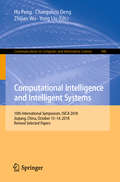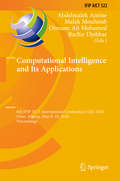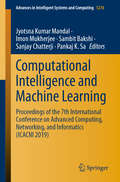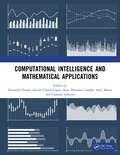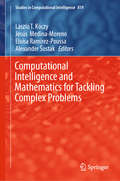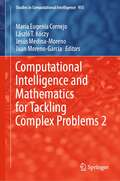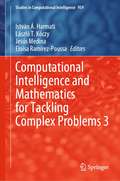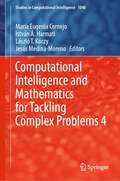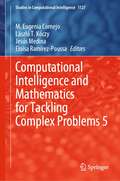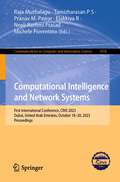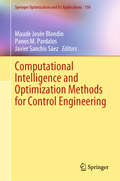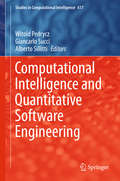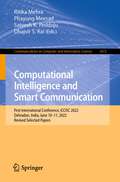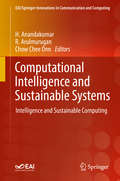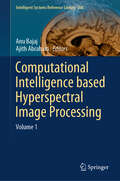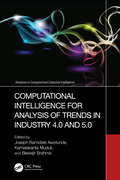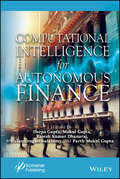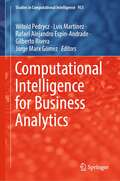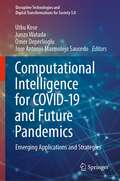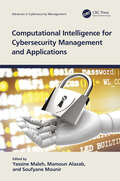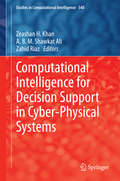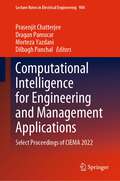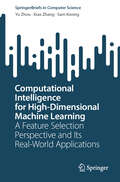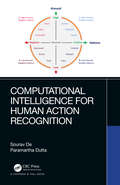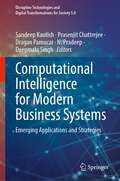- Table View
- List View
Computational Intelligence and Intelligent Systems: 9th International Symposium, Isica 2017, Guangzhou, China, November 18-20, 2017. Revised Selected Papers, Part I (Communications in Computer and Information Science #873)
by Yong Liu Hu Peng Changshou Deng Zhijian WuThis two-volume set (CCIS 873 and CCIS 874) constitutes the thoroughly refereed proceedings of the 9th International Symposium, ISICA 2017, held in Guangzhou, China, in November 2017. The 101 full papers presented in both volumes were carefully reviewed and selected from 181 submissions. This second volume is organized in topical sections on swarm intelligence: cooperative Search, swarm optimization; complex systems modeling: system dynamic, multimedia simulation; intelligent information systems: information retrieval, e-commerce platforms; artificial intelligence and robotics: query optimization, intelligent engineering; virtualization: motion-based tracking, image recognition.
Computational Intelligence and Its Applications: 6th IFIP TC 5 International Conference, CIIA 2018, Oran, Algeria, May 8-10, 2018, Proceedings (IFIP Advances in Information and Communication Technology #522)
by Abdelmalek Amine Malek Mouhoub Otmane Ait Mohamed Bachir DjebbarThis book constitutes the refereed proceedings of the 6th IFIP TC 5 International Conference on Computational Intelligence and Its Applications, CIIA 2018, held in Oran, Algeria, in May 2018.The 56 full papers presented were carefully reviewed and selected from 202 submissions. They are organized in the following topical sections: data mining and information retrieval; evolutionary computation; machine learning; optimization; planning and scheduling; wireless communication and mobile computing; Internet of Things (IoT) and decision support systems; pattern recognition and image processing; and semantic web services.
Computational Intelligence and Machine Learning: Proceedings of the 7th International Conference on Advanced Computing, Networking, and Informatics (ICACNI 2019) (Advances in Intelligent Systems and Computing #1276)
by Jyotsna Kumar Mandal Sambit Bakshi Imon Mukherjee Sanjay Chatterji Pankaj K. SaThis book focuses on both theory and applications in the broad areas of computational intelligence and machine learning. The proceedings of the Seventh International Conference on Advanced Computing, Networking, and Informatics (ICACNI 2019) present research papers in the areas of advanced computing, networking, and informatics. It brings together contributions from scientists, professors, scholars, and students and presents essential information on the topic. It also discusses the practical challenges encountered and the solutions used to overcome them, the goal being to promote the “translation” of basic research into applied research and of applied research into practice. The works presented here also demonstrate the importance of basic scientific research in a range of fields.
Computational Intelligence and Mathematical Applications: Proceedings of the International Conference on Computational Intelligence and Mathematical Applications
by Devendra Prasad Suresh Chand Gupta Anju Bhandari Gandhi Stuti Mehla Upasana LakhinaIt is with great pleasure to present the proceedings of the International Conference on Computational Intelligence and Mathematical Applications (ICCIMA 2023), held on 21-22 December 2023, at Panipat Institute of Engineering and Technology, Panipat. This conference brought scholars, researchers, professionals, and intellectuals together from diverse fields to exchange ideas, share insights, and foster collaborations in Optimization, Computational Intelligence and Mathematical Applications. The ICCIMA 2023 served as a platform for contributors to demonstrate their latest findings, discuss emerging trends, and explore innovations to the problems that different disciplines are currently experiencing. The conference’s scope and depth of themes reflect our community’s rich diversity of interests and levels of competence.
Computational Intelligence and Mathematics for Tackling Complex Problems (Studies in Computational Intelligence #819)
by Jesús Medina-Moreno Eloísa Ramírez-Poussa László T Kóczy Alexander ŠostakThis book combines computational intelligence and mathematics to solve theoretical and real-world problems. The real challenges of engineering and other applied sciences, e.g. economics and management, the social sciences, etc., and even everyday life, are increasingly raising complex problems – both in the usual sense, but also in the mathematical and theoretical computer science sense, which is referred to as intractability. Finding exact solutions to the latest problems in mathematics is impossible, and it has been also shown that no further technical advance will ever make it possible to find general and exact solutions to such complex problems. Rather, the goal is to find solutions that are “good enough” or “acceptably accurate,” including models and corresponding algorithms, which is most often achieved by combining traditional mathematical techniques and computational intelligence tools, such as fuzzy systems, evolutionary and memetic algorithms, and artificial neural networks. Consequently, international funding programs, such as the European Commission’s current framework program for research and innovation (Horizon 2020), and the preliminary research team building COST Actions, are devoted to developing new instruments for tackling the challenges that we face in the current technological age. And it goes without saying that research topics concerning the interactions between computational intelligence and traditional mathematics play a key role in overcoming the obstacles associated with the intractability of complex problems. In this book, mathematicians, engineers, and other scientists highlight novel methodological results connecting these two main research areas, and focusing on solving real-life problems.
Computational Intelligence and Mathematics for Tackling Complex Problems 2 (Studies in Computational Intelligence #955)
by László T. Kóczy María Eugenia Cornejo Jesús Medina-Moreno Juan Moreno-GarcíaThis book collects the final versions of the highest quality papers presented at the conference 11th European Symposium on Computational Intelligence and Mathematics held on October 2–5, 2019, in Toledo (Spain). The conjugation of computational sciences with different mathematical tools is essential in order to solve different challenges that arise in a wide-ranging knowledge areas. Nowadays, many promising research lines are being developed in this direction from the theoretical and applicational perspectives. In this publication, computational intelligence and mathematics are combined in interesting research works that aim to give answers to complex real problems. Moreover, the technical program of this conference included four excellent keynote speeches, given by Prof. José Luis Verdegay (Guidelines to solve Decision Making Problems), Prof. Joao Paulo Carvalho (Recommender Systems: Using Fuzzy Fingerprints for ``Proper'' Recommendations), Dr. Andreja Tepavcevic (Special lattice valued structures and approximate solutions of linear equations), and Prof. Juan Moreno-Garcia (Generating linguistic descriptions using Linguistic Petri Nets).
Computational Intelligence and Mathematics for Tackling Complex Problems 3 (Studies in Computational Intelligence #959)
by László T. Kóczy Jesús Medina Eloísa Ramírez-Poussa István Á. HarmatiComplex problems and systems, which prevail in the real world, cannot often be tackled and solved either by traditional methods offered by mathematics or even the traditional computer science (CS) and and artificial intelligence (AI)..). What is the way out of this dilemma? Advanced methodologies, and tools and techniques, „mimicking” human reasoning or the behavior of animals, animal populations or certain parts of the living bod, based on traditional computer science science and the initial approaches of artificial intelligence are often referred to as biologically inspired methods, or often computational intelligence (CI). Computational intelligence offers effective and efficient solutions to many „unsolvable" problems problems. However, it is far from being a ready to use and complete collection of approaches, and is rather a continuously developing field without clear borders. The emerging new models and algorithms of computational intelligence are deeply rooted in the vast apparatus of traditional mathematics. Thus, the investigation of connections and synergy between mathematics and computational intelligence is an eminent goal which is periodically pursued by a group of mathematicians and computational intelligence researchers who regularly attand the annual European Symposia on Computational Intelligence and Mathematics (ESCIM). Some relevant papers from the last ESCIM-2020 are included in this volume.
Computational Intelligence and Mathematics for Tackling Complex Problems 4 (Studies in Computational Intelligence #1040)
by László T. Kóczy María Eugenia Cornejo Jesús Medina-Moreno István Á. HarmatiThe recent book of the series continues the collection of articles dealing with the important and efficient combination of traditional and novel mathematical approaches with various computational intelligence techniques, with a stress of fuzzy systems, and fuzzy logic. Complex systems are theoretically intractable, as the need of time and space resources (e.g., computer capacity) exceed any implementable extent. How is it possible that in the practice, such problems are usually manageable with an acceptable quality by human experts? They apply expert domain knowledge and various methods of approximate modeling and corresponding algorithms. Computational intelligence is the mathematical tool box that collects techniques which are able to model such human interaction, while (new) mathematical approaches are developed and used everywhere where the complexity of the sub-task allows it. The innovative approaches in this book give answer to many questions on how to solve “unsolvable” problems.
Computational Intelligence and Mathematics for Tackling Complex Problems 5 (Studies in Computational Intelligence #1127)
by László T. Kóczy Jesús Medina Eloísa Ramírez-Poussa M. Eugenia CornejoThis book is focused on connecting two interesting research areas, mathematics and computational intelligence, by means of appealing contributions devoted to give solutions to different challenges of the current technological age.It continues the collection of articles dealing with the important and efficient combination of these both areas, with a stress of fuzzy systems and fuzzy logic. It also includes relevant papers on the development and application of mathematics, artificial intelligence, and automatic reasoning tools to Digital Forensics, which have been developed within the framework of the COST Action DigForASP-CA17124 (digforasp.uca.es).
Computational Intelligence and Network Systems: First International Conference, CINS 2023, Dubai, United Arab Emirates, October 18–20, 2023, Proceedings (Communications in Computer and Information Science #1978)
by Raja Muthalagu Tamizharasan P S Pranav M. Pawar Elakkiya R Neeli Rashmi Prasad Michele FiorentinoThis book constitutes the proceedings of the First International Conference, CINS 2023, held in Dubai, United Arab Emirates, from October 18 to 20, 2023.The 11 full papers included in this volume were carefully reviewed and selected from 130 submissions. This volume discusses contemporary challenges within computing systems and the utilization of intelligent approaches to improve computing methodologies, data processing capabilities, and the application of these intelligent techniques. The book also addresses several topics pertaining to networks, including security, network data processing, networks that transcend boundaries, device heterogeneity, and advancements in networks connected to the Internet of Things, software-defined networks, cloud computing, and intelligent networks.
Computational Intelligence and Optimization Methods for Control Engineering (Springer Optimization and Its Applications #150)
by Panos M. Pardalos Maude Josée Blondin Javier Sanchis SáezThis volume presents some recent and principal developments related to computational intelligence and optimization methods in control. Theoretical aspects and practical applications of control engineering are covered by 14 self-contained contributions. Additional gems include the discussion of future directions and research perspectives designed to add to the reader’s understanding of both the challenges faced in control engineering and the insights into the developing of new techniques. With the knowledge obtained, readers are encouraged to determine the appropriate control method for specific applications.
Computational Intelligence and Quantitative Software Engineering (Studies in Computational Intelligence #617)
by Giancarlo Succi Witold Pedrycz Alberto SillittiIn a down-to-the earth manner, the volume lucidly presents how the fundamental concepts, methodology, and algorithms of Computational Intelligence are efficiently exploited in Software Engineering and opens up a novel and promising avenue of a comprehensive analysis and advanced design of software artifacts. It shows how the paradigm and the best practices of Computational Intelligence can be creatively explored to carry out comprehensive software requirement analysis, support design, testing, and maintenance. Software Engineering is an intensive knowledge-based endeavor of inherent human-centric nature, which profoundly relies on acquiring semiformal knowledge and then processing it to produce a running system. The knowledge spans a wide variety of artifacts, from requirements, captured in the interaction with customers, to design practices, testing, and code management strategies, which rely on the knowledge of the running system. This volume consists of contributions written by widely acknowledged experts in the field who reveal how the Software Engineering benefits from the key foundations and synergistically existing technologies of Computational Intelligence being focused on knowledge representation, learning mechanisms, and population-based global optimization strategies. This book can serve as a highly useful reference material for researchers, software engineers and graduate students and senior undergraduate students in Software Engineering and its sub-disciplines, Internet engineering, Computational Intelligence, management, operations research, and knowledge-based systems.
Computational Intelligence and Smart Communication: First International Conference, ICCISC 2022, Dehradun, India, June 10–11, 2022, Revised Selected Papers (Communications in Computer and Information Science #1672)
by Phayung Meesad Sateesh K. Peddoju Ritika Mehra Dhajvir S. RaiThis book constitutes the proceedings of the First International Conference on Computational Intelligence and Smart Communication, ICCISC 2022, was held in Dehradun, India, in June 2022.The 8 full papers and 1 short paper presented in this volume were carefully reviewed and selected from 56 submissions. The aim of the conference was to provide a platform to the researchers and practitioners from both academia as well as industry to meet and share cutting-edge development in the field of Computational Intelligence and Smart Communication. It also focused on all aspects of computation intelligence and data sciences with modern and emerging computational topics.The papers are organized in the following topical sections: Wireless Sensor Networks and Computing Technologies; Networks, Security and Privacy Parallel & Distributed Networks; Smart Communication and Technology; and Emerging Computing Computational Intelligence.
Computational Intelligence and Sustainable Systems: Intelligence and Sustainable Computing (EAI/Springer Innovations in Communication and Computing)
by H. Anandakumar R. Arulmurugan Chow Chee OnnThis book features research related to computational intelligence and energy and thermal aware management of computing resources. The authors publish original and timely research in current areas of power, energy, temperature, and environmental engineering as and advances in computational intelligence that are benefiting the fields. Topics include signal processing architectures, algorithms, and applications; biomedical informatics and computation; artificial intelligence and machine learning; green technologies in information; and more. The book includes contributions from a wide range of researchers, academicians, and industry professionals. The book is made up both of extended papers presented at the International Conference on Intelligent Computing and Sustainable System (ICICSS 2018), September 20-21, 2018, and other accepted papers on R&D and original research work related to the practice and theory of technologies to enable and support Intelligent Computing applications.
Computational Intelligence based Hyperspectral Image Processing: Volume 1 (Intelligent Systems Reference Library #268)
by Ajith Abraham Anu BajajHyperspectral imaging has revolutionized fields ranging from environmental monitoring to medical diagnostics by providing detailed spectral information across vast datasets. However, the complexity and high dimensionality of hyperspectral data pose significant challenges in analysis and interpretation. “Computational Intelligence based Hyperspectral Image Processing" is a comprehensive guide to overcoming these challenges by leveraging the latest computational intelligence techniques. This Volume comprises of 9 chapters that illustrate how computational intelligence-based solutions has been successful to improve efficiency and productivity, quality control, and in enhancing innovation and competitiveness with cost reduction. This book is an essential resource for researchers, professionals, and students working in remote sensing, image processing, and computational intelligence. Whether you're new to the field or looking to deepen your expertise, this book provides the tools and knowledge you need to succeed in the fast-evolving world of hyperspectral imaging.
Computational Intelligence for Analysis of Trends in Industry 4.0 and 5.0 (Advances in Computational Collective Intelligence)
by Kamalakanta Muduli Biswajit BrahmaIndustry 4.0 and Industry 5.0 applications will revolutionize production, enabling smart manufacturing machines to interact with their environments. These machines will become self-aware, self-learning, and capable of real-time data interpretation for self-diagnosis and prevention of production issues. They will also self-calibrate and prioritize tasks to enhance production quality and efficiency.Computational Intelligence for Analysis of Trends in Industry 4.0 and 5.0 examines the trends in applications that merge three key disciplines: Computational Intelligence (CI), Industry 4.0, and Industry 5.0. It presents solutions using industrial Internet of Things (IIoT) technologies, augmented by CI-based techniques, modeling, controls, estimations, applications, systems, and future scopes. These applications use data from smart sensors, processed through enhanced CI methods, to make smart automation more effective.Industry 4.0 integrates data and intelligent automation into manufacturing, using technologies like CI, Internet of Things (IoT), IIoT, and cloud computing. It transforms data into actionable insights for decision-making and process optimization, essential for modern competitive businesses managing high-speed data integration in production processes. Currently, Industry 4.0 and Industry 5.0 are undergoing significant transformations due to advances in applying artificial intelligence (AI), big data analytics, telecommunication technologies, and control theory. These trends are increasingly multidisciplinary, integrating mechanical, control, and information technologies. However, they face technical challenges such as parametric uncertainties, external disturbances, sensor noise, and mechanical failures. To address these issues, this book examines trends such as CI technologies as fuzzy logic, neural networks, and reinforcement learning and their application to modeling, control, and estimation. It also covers recent advancements in IIoT sensors, microcontrollers, and big data analytics that further enhance CI-based solutions in Industry 4.0 and Industry 5.0 systems.
Computational Intelligence for Autonomous Finance (Fintech in a Sustainable Digital Society)
by Balamurugan Balusamy Rajesh Kumar Dhanaraj Deepa Gupta Mukul Gupta Parth Mukul GuptaThe book serves as an essential guide and a deep dive into the intersection of AI and finance, providing readers with a thorough understanding of the current state, challenges, and future possibilities of autonomous financial systems. In the rapidly evolving domain of autonomous finance, the convergence of computational intelligence techniques and financial technologies has paved the way for a new era of financial services. This transformation is driven by the integration of artificial intelligence (AI), machine learning (ML), blockchain, and big data analytics into financial systems, leading to the development of more responsive, efficient, and personalized financial products and services. Computational Intelligence for Autonomous Finance delves into the heart of this technological revolution, offering a comprehensive exploration of the theoretical foundations, practical applications, and future prospects of computational intelligence in the financial sector. The backbone of autonomous finance is a complex, interconnected ecosystem that leverages computational intelligence to automate decision-making processes, optimize financial operations, and enhance customer experiences. The book introduces the concept of an Intelligent Autonomous Financial Network (IAFN), which integrates various computational intelligence techniques with cutting-edge financial technologies to create a self-organizing, adaptive, and scalable financial system. The IAFN framework facilitates seamless interactions between diverse financial entities, enabling the provision of innovative financial services such as automated trading, real-time risk management, personalized financial planning, and fraud detection. The book meticulously analyzes the key challenges including data security and privacy concerns, algorithmic biases, regulatory compliance, and the need for interoperable standards. It also presents state-of-the-art solutions and best practices for overcoming these challenges, emphasizing the importance of ethical AI, robust data protection mechanisms, transparent algorithms, and collaborative regulatory frameworks. It discusses emerging trends such as quantum computing, edge computing, and decentralized finance (DeFi), highlighting their potential to further transform the financial landscape. The book also addresses the societal implications of autonomous finance, including its impact on employment, wealth distribution, and financial inclusion, advocating for a balanced approach that maximizes benefits while minimizing negative outcomes. Audience This book is aimed at researchers, industry professionals, policymakers, and graduate students in finance, computational intelligence, and related fields.
Computational Intelligence for Business Analytics (Studies in Computational Intelligence #953)
by Witold Pedrycz Jorge Marx Gómez Luis Martínez Rafael Alejandro Espin-Andrade Gilberto RiveraCorporate success has been changed by the importance of new developments in Business Analytics (BA) and furthermore by the support of computational intelligence- based techniques. This book opens a new avenues in these subjects, identifies key developments and opportunities. The book will be of interest for students, researchers and professionals to identify innovative ways delivered by Business Analytics based on computational intelligence solutions. They help elicit information, handle knowledge and support decision-making for more informed and reliable decisions even under high uncertainty environments.Computational Intelligence for Business Analytics has collected the latest technological innovations in the field of BA to improve business models related to Group Decision-Making, Forecasting, Risk Management, Knowledge Discovery, Data Breach Detection, Social Well-Being, among other key topics related to this field.
Computational Intelligence for COVID-19 and Future Pandemics: Emerging Applications and Strategies (Disruptive Technologies and Digital Transformations for Society 5.0)
by Junzo Watada Utku Kose Omer Deperlioglu Jose Antonio Marmolejo SaucedoThe book covers a wide topic collection starting from essentials of Computational Intelligence to advance, and possible application types against COVID-19 as well as its effects on the field of medical, social, and different data-oriented research scopes. Among these topics, the book also covers very recently, vital topics in terms of fighting against COVID-19 and solutions for future pandemics. The book includes the use of computational intelligence for especially medical diagnosis and treatment, and also data-oriented tracking-predictive solutions, which are key components currently for fighting against COVID-19. In this way, the book will be a key reference work for understanding how computational intelligence and the most recent technologies (i.e. Internet of Healthcare Thing, big data, and data science techniques) can be employed in solution phases and how they change the way of future solutions. The book also covers research works with negative results so that possible disadvantages of using computational intelligence solutions and/or experienced side-effects can be known widely for better future of medical solutions and use of intelligent systems against COVID-19 and pandemics. The book is considering both theoretical and applied views to enable readers to be informed about not only research works but also theoretical views about essentials/components of intelligent systems against COVID-19/pandemics, possible modeling scenarios with current and future perspective as well as solution strategies thought by researchers all over the world.
Computational Intelligence for Cybersecurity Management and Applications (Advances in Cybersecurity Management)
by Yassine Maleh Mamoun Alazab Soufyane MounirAs cyberattacks continue to grow in complexity and number, computational intelligence is helping under-resourced security analysts stay one step ahead of threats. Drawing on threat intelligence from millions of studies, blogs, and news articles, computational intelligence techniques such as machine learning and automatic natural language processing quickly provide the means to identify real threats and dramatically reduce response times. Computational Intelligence for Cybersecurity Management and Applications collects and reports on recent high-quality research addressing different cybersecurity challenges. It: Explore the newest developments in the use of computational intelligence and AI for cybersecurity applications; Provide several case studies related to computational intelligence techniques for cybersecurity in a wide range of applications (Smart Healthcare, Blockchain, Cyber-Physical System, etc.); Integrate theoretical and practical aspects of computational intelligence for cybersecurity so that any reader, from novice to expert, may understand the book's explanations of key topics. The book offers comprehensive coverage of the essential topics, including: Machine Learning and Deep Learning for cybersecurity Blockchain for cybersecurity and privacy Security engineering for Cyber-physical systems AI and Data Analytics techniques for cybersecurity in smart systems Trust in digital systems This book discusses the current state of the art and practical solutions for the following cybersecurity and privacy issues using artificial intelligence techniques and cutting-edge technology. Readers interested in learning more about computational intelligence techniques for cybersecurity applications and management will find this book invaluable. They will get insight into potential avenues for future study on these topics and be able to prioritize their efforts better.
Computational Intelligence for Decision Support in Cyber-Physical Systems (Studies in Computational Intelligence #540)
by Zeashan H Khan A. B. M. Shawkat Ali Zahid RiazThis book is dedicated to applied computational intelligence and soft computing techniques with special reference to decision support in Cyber Physical Systems (CPS), where the physical as well as the communication segment of the networked entities interact with each other. The joint dynamics of such systems result in a complex combination of computers, software, networks and physical processes all combined to establish a process flow at system level. This volume provides the audience with an in-depth vision about how to ensure dependability, safety, security and efficiency in real time by making use of computational intelligence in various CPS applications ranging from the nano-world to large scale wide area systems of systems. Key application areas include healthcare, transportation, energy, process control and robotics where intelligent decision support has key significance in establishing dynamic, ever-changing and high confidence future technologies. A recommended text for graduate students and researchers working on the applications of computational intelligence methods in CPS.
Computational Intelligence for Engineering and Management Applications: Select Proceedings of CIEMA 2022 (Lecture Notes in Electrical Engineering #984)
by Morteza Yazdani Prasenjit Chatterjee Dilbagh Panchal Dragan PamucarThis book comprises select proceedings of the 1st International Conference on Computational Intelligence for Engineering and Management Applications (CIEMA - 2022). This book emphasizes applications of computational intelligence including machine intelligence, data analytics, and optimization algorithms for solving fundamental and advanced engineering and management problems. This book serves as a valuable resource for researchers, industry professionals, academicians, and doctoral scholars in engineering, production, thermal, materials, design, computer engineering, natural sciences, and management who work on computational intelligence. The book also serves researchers who are willing to use computational intelligence algorithms in real-time applications.
Computational Intelligence for High-Dimensional Machine Learning: A Feature Selection Perspective and Its Real-World Applications (SpringerBriefs in Computer Science)
by Yu Zhou Xiao Zhang Sam KwongThis book focuses on the modelling and optimization aspects of the feature selection problem through computational intelligence methods in complex, high-dimensional supervised machine learning. To aid readers in conducting research in this field, it covers fundamental concepts and state-of-the-art algorithms. This book also provides a detailed insight into applying these algorithms into real-world applications. The authors begin by introducing the definition high-dimensional machine learning (ML) problems and the challenges they pose. Subsequently, they delve into dimension reduction methods for high-dimensional ML, including global and local feature selection (FS) techniques. This book also comprehensively presents computational intelligence methods such as evolutionary computation and deep neural networks for FS, supported by both theoretical and empirical evidence. Furthermore, this book explores real-world scenario applications involving high-dimensional ML, particularly in the context of smart cities, bioinformatics and industrial informatics. This book is a suitable read for postgraduates and researchers who are interested in the research areas of computational intelligence, soft computing, machine learning and deep learning. Professionals and practitioners within these related fields will also benefit from this book.
Computational Intelligence for Human Action Recognition (Chapman & Hall/CRC Computational Intelligence and Its Applications)
by Sourav De and Paramartha DuttaHuman Action Recognition is a challenging area presently. The vigor of research effort directed towards this domain is self indicative of this. With the ever-increasing involvement of Computational Intelligence in our day to day applications, the necessity of human activity recognition has been able to make its presence felt to the concerned research community. The primary drive of such an effort is to equip the computing system capable of recognizing and interpreting human activities from posture, pose, gesture, facial expression etc. The intent of human activity recognition is a formidable component of cognitive science in which researchers are actively engaged of late. Features: A systematic overview of the state-of-the-art in computational intelligence techniques for human action recognition. Emphasized on different intelligent techniques to recognize different human actions. Discussed about the automation techniques to handle human action recognition. Recent research results and some pointers to future advancements in this arena. In the present endeavour the editors intend to come out with a compilation that reflects the concerns of relevant research community. The readers would be able to come across some of the latest findings of active researchers of the concerned field. It is anticipated that this treatise shall be useful to the readership encompassing students at undergraduate and postgraduate level, researchers active as well as aspiring, not to speak of the senior researchers.
Computational Intelligence for Modern Business Systems: Emerging Applications and Strategies (Disruptive Technologies and Digital Transformations for Society 5.0)
by Sandeep Kautish Prasenjit Chatterjee Dragan Pamucar Deepmala Singh N. PradeepThis book covers the applications of computational intelligence techniques in business systems and advocates how these techniques are useful in modern business operations. The book redefines the computational intelligence foundations, the three pillars - neural networks, evolutionary computation, and fuzzy systems. It also discusses emerging areas such as swarm intelligence, artificial immune systems (AIS), support vector machines, rough sets, and chaotic systems. The other areas have also been demystified in the book to strengthen the range of computational intelligence techniques such as expert systems, knowledge-based systems, and genetic algorithms. Therefore, this book will redefine the role of computational intelligence techniques in modern business system operations such as marketing, finance & accounts, operations, personnel management, supply chain management, and logistics. Besides, this book guides the readers through using them to model, discover, and interpret new patterns that cannot be found through statistical methods alone in various business system operations. This book reveals how computational intelligence can inform the design and integration of services, architecture, brand identity, and product portfolio across the entire enterprise. The book will provide insights into research gaps, open challenges, and unsolved computational intelligence problems. The book will act as a premier reference and instant material for all the users who are contributing/practicing the adaptation of computational intelligence modern techniques in business systems.
